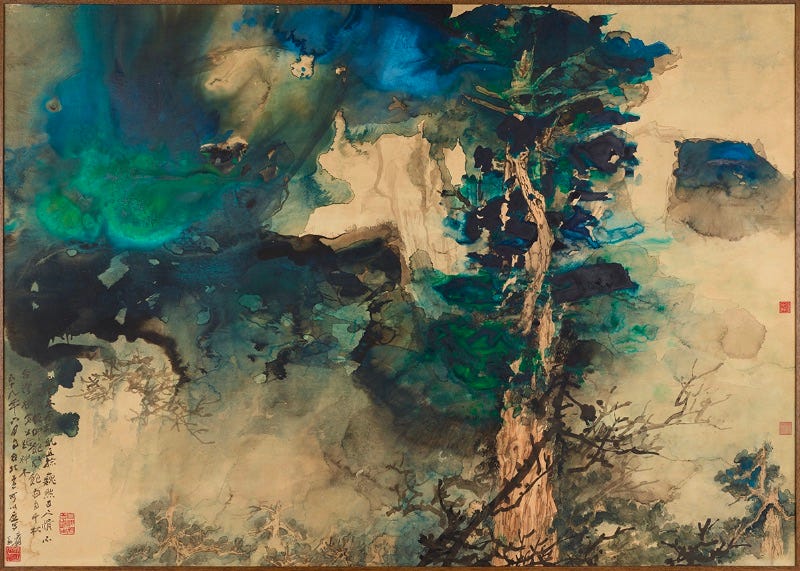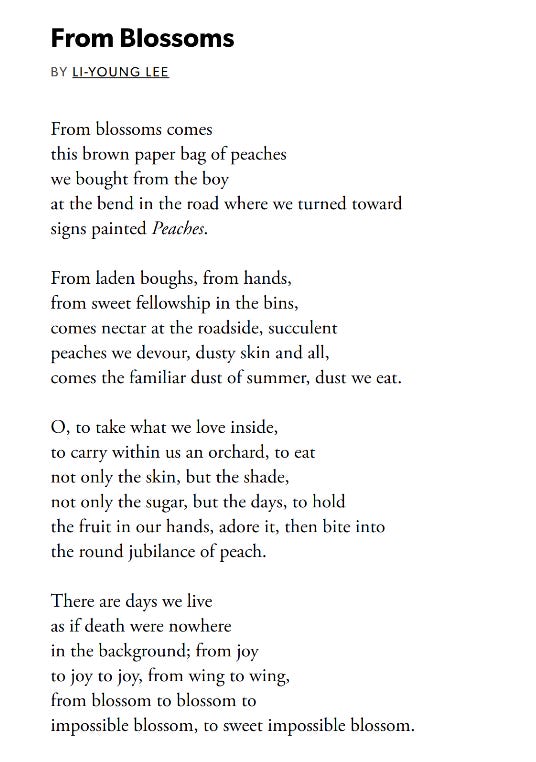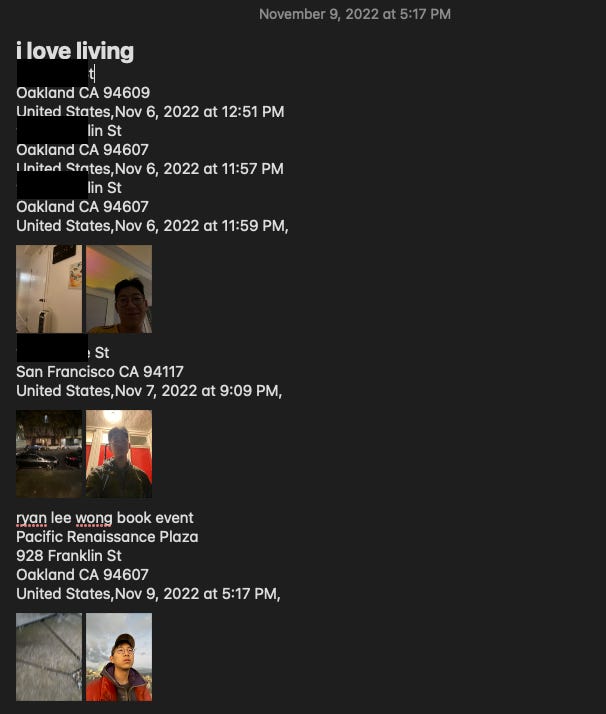I'm headed to the Haight for an event with Ryan Lee Wong for his debut novel. It's a rainy Monday night, and I ride into the city on the BART, transferring at Montgomery to the MUNI. I find myself surprised at my wonder towards the whole experience: the efficiency, the details of commuting passengers (a man carries Afterparties stuffed into his backpack's bottle pocket, two discuss the recent tech layoffs and their theories of Elon's plans). When I step off by Beit Rima, there's a woman in a full-body bunny suit waving a "No on J" sign who salutes me as I nod back. I walk along the dark, wet streets, eyes drawn to the occasional warm light streaming out of townhouse windows. I take it all in. I breathe in deeply. I find myself looking at every passerby with genuine curiosity, with compassion, with love.
Meditation is learning to move towards love when you find it says Wong. He's a Zen Buddhist, works at the Brooklyn Zen Center, spent two years living at a remote temple in upstate New York as COVID raged the world. He describes how he operated as a different person there. How he interrogated all his motives for writing the book and came up with nothing that felt worthy. How an event began haunting him and anchored him around the community and his story. How from that moment, his very surroundings seemed to conspire to help him finish.
I think if you have the courage to move towards what you love, you start to shape your surroundings and the earth itself to help you.
It took me at least 23 years (meaning I just started to be aware of this in the past two years) for me to learn and embody this perspective. I learned what I love by learning how to listen (to myself and my inner voice). I learned that I need to be free in how I pour my all into what I love. The first time I felt this attitude in my body, I felt so much invisible weight lift.
For so long I had shouldered extrinsic burdens pushing me to repress what I love. Because it would make some people uncomfortable. Because I would have to make changes to my life. Because it was too much, some might not understand, and was it really that important to me anyways? I pushed it down, buttoned the latches, reinforced the walls with soundproof covers. I covered it with layers and layers and layers of duck tape. Patchwork construction and shodden structures. It's almost as if I was trying to give it a way out, test its metal, forge its strength against increasingly formidable challenges. And then the time came when nothing could keep it down anymore. It would not submit to being caged up again. The weights were off; the old world was dead.
Love became accepted. Love became the norm. Love felt limitless, unending, abundant. It was falling from the sky in droves, pouring out of the sidewalks, sprinkled across the grass like those plastic eggs that they put out during Easter, enough for every kid to find several to think they’re special. Love was a stream in your backyard where you’d collect water, wash yourself, cut your toe on rocks jumping from side to side. Love was a forever rotating walk with all the people you love. Love was waking up hungover after 3 hours of sleep to hike a mountain at 3AM in the dark for the moment the sun breaks over the horizon and the stones, trees, clouds, tired faces ease into light.
My general attitude towards life became one of wearing my heart on my sleeve, seeking to experience and appreciate all of life, even the parts that feel impossible to bear in the moment. I want to move towards what feels right in every moment, to sit with feelings, even when they are sharp or beyond comprehension, to proclaim self-expression from the top of the rooftops. But I find it hard to always embody that. My natural fear takes over sometimes as a self-defense mechanism. Life can help you tear down inner walls, but it can also push you to build even taller ones, with barbed wire lining the tops and sentries patrolling the perimeter. I wondered: how can I gain the strength to say no to walls, to trudge on after each time I fall?
Believing in love is like believing in a religion. It requires faith because it avoids understanding. Love is the largest possible word, meaning so much as to mean nothing writes Helena Fitzgerald in Griefbacon. Love, despite (or maybe because of) its vacuous nature, asks for your whole self. It demands you to be honest, challenges you to be stubborn, pushes you to the brink. When you find yourself in the depths of doubt, love calls you back. When you’re expecting least, when you think you’ve escaped beyond walls of reason, you hear sweet in your ear. Then you’re running. You’re scaling the walls, leaping over wires. You’re dancing in the minefield.
I'd always been scared of "I love you" because it seemed to imply a promise, but these days, I feel and receive love freely. If it can be everything in the world and a bunch of bullshit, I might as well make that jumble of nothing and everything my own.
I love the way sunlight lands on my apartment wall during sunset, a little window into a stage for my shadow to dance in. I love the way hands feel, how a finger can share years of history. I love the wind, both when it’s a gentle breeze caressing my ear and when it’s a furious gust, vying to blow me away. I love computers and how they can be a medium for creative expression and connection, how they gave me a space to find myself when I felt I couldn’t find it anywhere else. I love spacious spaces and endearing environments: physical or digital, I love community spaces where I can find peaceful solitude among others. I love parallel play, coexisting, reading side-by-side and clicking away on laptops across from each other at a cafe table. I love the people in my life who make me feel exceptionally safe, who I can tolerate for many hours on end without stop. I love those who inspire me, constantly, intentionally and sometimes not, to be better, to question how I can think clearer, act kinder, love deeper, create freer, laugh harder, dream further. I love those who see and seek out wonder, beauty, dreams, and love, of course, in all of life, in everything they do, in the way they carry themselves. I love people, spaces, objects that carry a loving reverence towards the world and themselves, who seem, with every breath they take, to say to them: thank you. thank you for giving me everything.
If you liked this, here’s a poem from Li-Young Lee you might enjoy:
I’ve also been thinking about how software or technology can help us notice, feel, and preserve moments of love. I want to make tools for wonder, those that can help us cultivate a default state of gratitude and generation, that teach us to seek out beauty everywhere. I started maintaining a little note where I update each time I get the overwhelming sensation of “I love life.” I find that making lists for these sorts of things is a virtuous cycle because I notice the moments more and grow to appreciate them more. Would love to hear if you have any practices that are similar!
other updates
I released the OpenAI pack for Coda. I’m excited to see how we can make the power of AI more accessible and put it in the hands of people via their everyday tools and data. Read more about it in this twitter thread







I keep a daily gratitude journal! love the idea of having it in notes app, make it easy to jot down. used to want to make a gratitude journal app where friends could see daily gratitude posts hehe. loved this post Spencer thank u!🤍